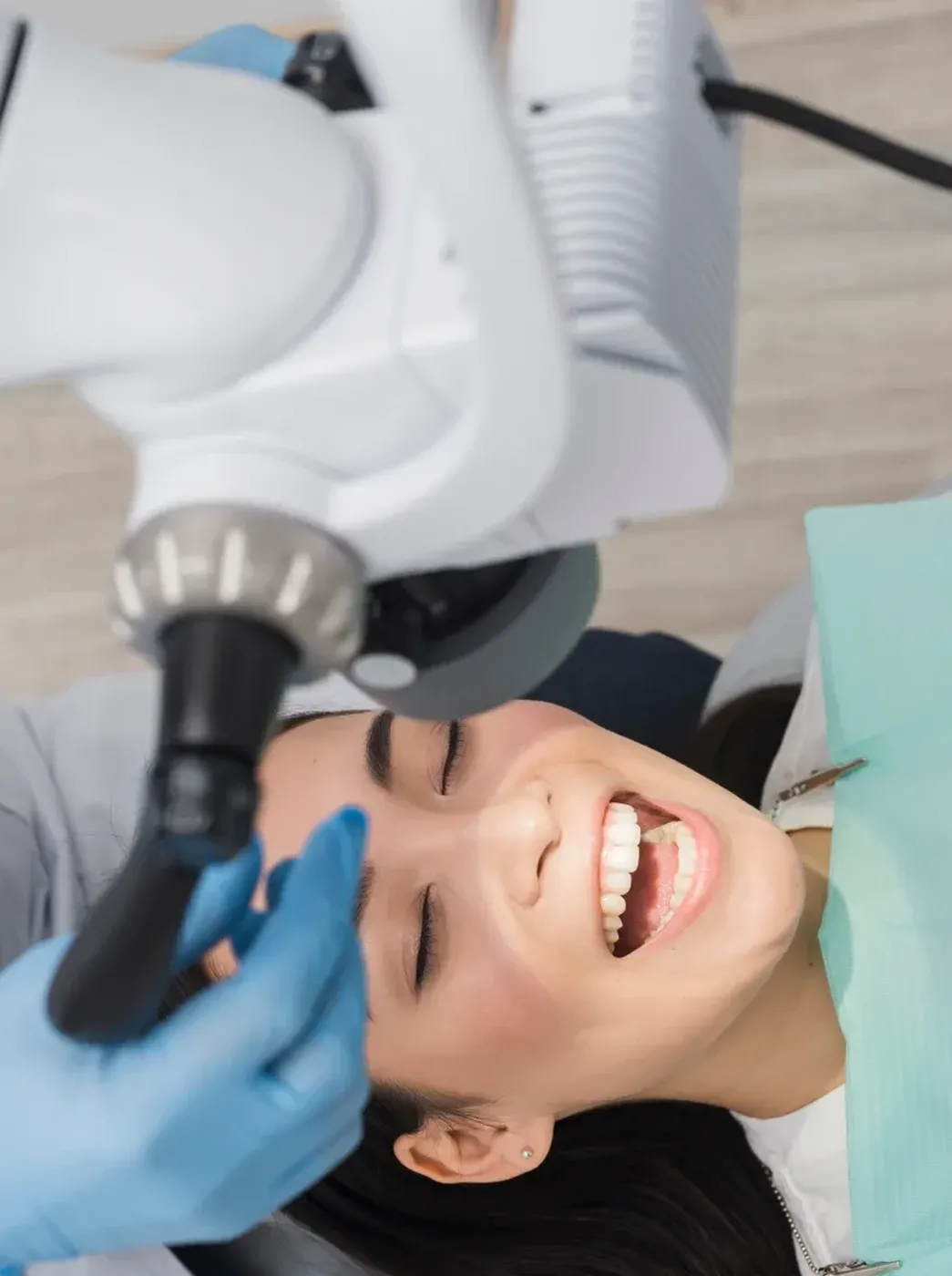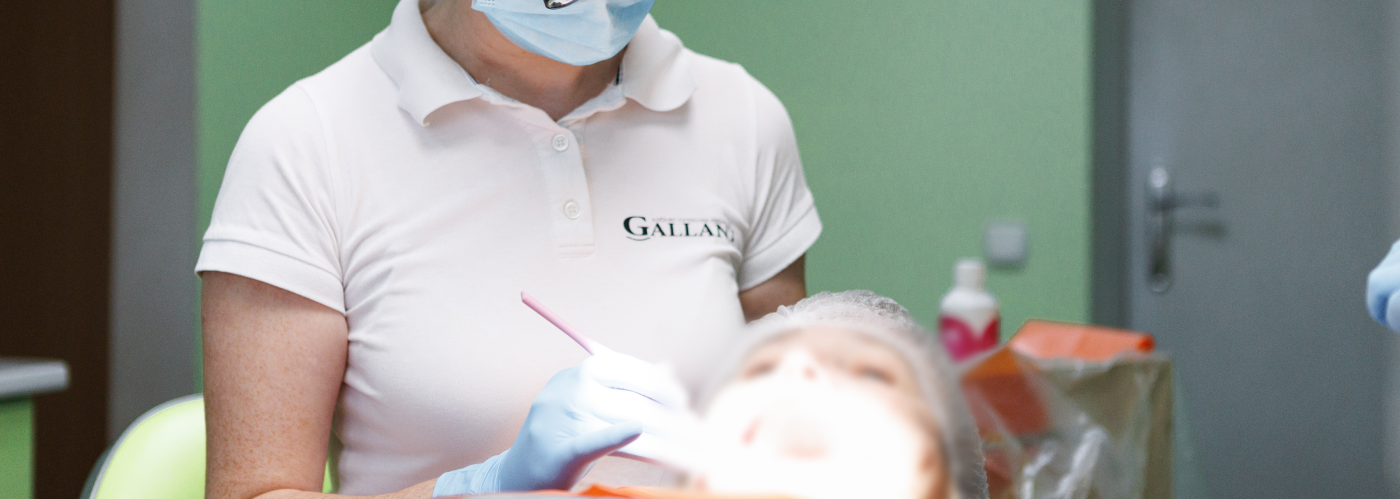
Zirconia crown
Zirconia Crowns at Gallant Dental Clinic
Zirconia crowns, made from zirconium dioxide (ZrO₂), represent a top achievement in modern dentistry. These metal-free solutions are extremely strong, withstand intense biting forces and temperature fluctuations, all while providing a natural aesthetic. The material is hypoallergenic and completely safe, and precision laser fabrication ensures outstanding fit.
Although zirconia crowns are slightly more expensive than alternative prostheses, their superior durability and safety justify the investment. Prices vary depending on the complexity of the crown and the individual clinical situation.
What are zirconia crowns?
A zirconia crown is a prosthetic structure made from biocompatible, polycrystalline zirconium dioxide. This material delivers strength that surpasses other crown types. It handles heavy chewing loads well and offers excellent natural aesthetics.
Medical-grade zirconia undergoes multi-stage purification and treatment to guarantee safety and quality.
Two main types of zirconia are used:
- Full-contour (monolithic) zirconia – solid crowns with maximum strength and longevity, ideal for heavy-load areas.
- Zirconia with porcelain overlay – a zirconia core layered with porcelain to enhance natural appearance, indistinguishable from real teeth.
Zirconia powders often include up to 9% magnesium or yttrium oxides, boosting mechanical properties and stability.
Zirconia is as impermeable as natural enamel, making it possible to create a crown that’s virtually indistinguishable from a natural tooth.
Indications for zirconia prosthetics
Zirconia crowns are indicated for:
- Microcracks or enamel chipping
- Untreatable discoloration
- Large diastemas (gaps between teeth)
- Missing teeth
- Preserving weakened yet viable teeth
- Deep cavities
They are commonly used on molars. Zirconia is non-porous and resists wear, performing well under heavy chewing pressure. In anterior teeth, its aesthetic and optical properties offer a natural look. Zirconia crowns on implants are ideal for both single-tooth and full arch restorations. They’re recommended for patients with metal allergies since zirconia doesn’t cause metallic taste, galvanic reactions, gum discoloration, or other metal-related side effects.
Advantages of zirconia crowns
- Safety: Biocompatible, greatly reducing allergy risk since its structure is bone-like
- Strength: Resistant to cracks, with molecular-level repair of minor defects
- Durability: Can last 15 years or more
- Aesthetic: Optical properties mimic enamel and come in customizable shades
- Minimal tissue removal: Typically no root canal or extensive grinding needed
- Metal-free: No metallic components means no metallic taste or oxidation issues
- Low thermal conductivity: No sensitivity to temperature changes
- Long-lasting look: Resistant to staining and color shifts
- Gum-friendly: No irritation or dark gum lines
- Versatility: Suitable for veneers and full-arch bridges
Tooth decay protection: Zirconia crowns protect against tooth decay beneath the restoration.
Advanced digital manufacturing ensures highly accurate anatomy and reduces stress on jaw muscles.
Colour range of zirconia dental prostheses
Zirconia crowns have a white base colour, which can be lightened or darkened according to the patient’s preferences. It is also possible to shade the crowns in various tones using special colouring agents that are applied to their surface. To select the right shade of zirconia crowns, dentists use special shade guides. The colour selection is carried out by the dentist or dental technician, taking into account the colour of the neighbouring teeth, gums, skin, and hair of the patient in order to achieve the highest possible resemblance to natural teeth and match with the patient’s appearance.
Lifespan of zirconia crowns
The lifespan of zirconia crowns varies depending on several factors, such as oral hygiene and usage conditions. On average, these crowns can last up to 15 years or even longer if properly cared for and high hygiene is maintained.
Regular dental check-ups will help extend the life of the prostheses.
Zirconia prosthesis installation: step-by-step process
Prosthetic treatment with zirconium dioxide follows a standard procedure: first, an impression is taken using a self-setting plaster material, which is then used to create the prosthesis. After that, a fitting is performed, and minor adjustments are made if necessary. At our clinic, we also offer crowns created using computer-assisted technology. The crown framework is shaped through milling (CAD/CAM).
At the first stage, the dentist conducts a detailed examination of the patient’s oral cavity, identifying and addressing any issues that may complicate the prosthetic process. Damaged teeth are treated, and tartar and cavities are removed. It may be necessary to place a core build-up or a post. All preparatory steps include tooth preparation for the crown. Thanks to the properties of zirconium dioxide, extensive tooth reduction can be avoided, as the minimum thickness of the zirconia layer is only 0.4 mm.
The process of creating a zirconia crown using computer modelling technology offers several advantages over traditional casting. The technology is based on laser scanning and subsequent parameter determination of the future tooth via specialised computer software. This ensures exceptional precision and craftsmanship in fabrication. Once the model is ready, the digital data is transferred to a milling machine, which precisely carves out the framework.
Thanks to modern manufacturing methods, the gap between the zirconia crown and the natural tooth has been reduced from 100 to 30 microns, significantly lowering the risk of inflammation beneath the structure. Moreover, computer modelling helps avoid errors during the creation of the crown blank. This means that the crowns do not require additional fitting or correction.
The finished prosthesis is placed onto the prepared area. The patient is given time to evaluate the comfort of wearing the structure. If no adjustments are needed, the prosthesis is permanently fixed using dental cement.
Request a call
We will contact you to schedule a convenient time for your consultation and connect you with the right specialist
What is the strength of a zirconia crown?
Zirconium Dioxide (the material used to make zirconia crowns) is one of the strongest dental materials available. It is 10 times stronger than natural enamel and 3 times stronger than common ceramic restorations. This makes it an excellent choice for withstanding daily chewing forces.
Zirconia crowns have a hardness of around 1200 MPa, which means they are highly resistant to chipping and cracking. With proper care and oral hygiene, a zirconia crown can last over 20 years — and in many cases, even a lifetime.

How is a zirconia crown made?
Zirconia crowns represent a major step forward in digital dentistry, where the goal is to automate the entire process as much as possible and minimise human error. Here's how it works: The process begins with a digital impression, captured using an intraoral 3D dental scanner directly inside the patient's mouth. This scan replaces traditional molds and provides a highly accurate 3D model of the tooth. The digital file is then sent to a dental laboratory, where a dental technician uses specialised 3D design software to virtually model the crown or bridge. Once the design is complete, the 3D file is transferred to a milling machine (3D-milling unit), which precisely carves the crown from a solid block of zirconia with an accuracy of up to 15 microns. After milling, the crown is further refined by a technician, who applies custom colouring using special dental stains. Finally, the crown is coated with a thin layer of clear glaze, giving it a lifelike shine and ensuring long-lasting aesthetics.

What are the indications for zirconia crown placement?
- restoration of severely damaged or destroyed teeth;
- replacement of old or unaesthetic crowns;
- restoration of teeth after endodontic treatment (root canal therapy);
- desire to improve the aesthetic appearance of the smile.

What is the lifespan of a zirconia crown?
Up to 20 years



Request a call
We will contact you to schedule a convenient time for your consultation and connect you with the right specialist

Request a call
We’ll get back to you shortly!

Leave a Review
Your feedback means a lot to us!


